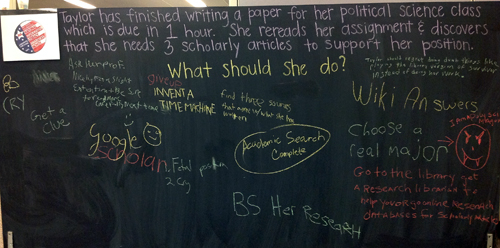During the month of October designated as National Information Literacy Awareness Month UC Libraries invited students to think about scenarios that have to do with the ethics of using information. At the end of the month we posted the following scenario:

A few responses suggested reversing the time. Wouldn’t it be wonderful to be able to do that?! While we are waiting for the invention of the time machine (if you are working on it, please let us know), let’s look at some other suggestions.
Students shared some of their favorite research resources, from WikiAnswers and Google Scholar to Academic Search Complete. While the mention of library databases is music to librarians’ ears, we are sorry to say that finding sources after the paper is written is too late. Even if Taylor could find articles that would support what she wrote, as someone suggested, she did not really use them to inform her research and help with her conclusions or recommendations.
We were very pleased that one of the comments suggested talking to a librarian. In fact this situation is not uncommon and sometimes we hear, “I wrote my paper, now I need my sources, please help!” What we say in this situation is that listing sources that were not used constitutes fabrication, which, along with plagiarism, is a serious violation. UC Student Code of Conduct defines fabrication as “the falsification of any information, research statistics, lab data, or citation in an academic exercise.” We would certainly be happy to point Taylor to resources for her research, but we would definitely recommend that she should talk to her course instructor and explain what happened. Unfortunately we could not guarantee that the instructor would give her an extension, but being honest about the situation and not trying to fake research that did not happen is the right thing to do.
Making the right decision based on understanding what constitutes ethical and legal use of information resources is an essential information literacy skill. Please remember that librarians are always happy to help you do and present your research honestly and responsibly.
